GeoRaman International Advisory Committee (GRISAC)
President
Dr. Adam Culka
Charles University, Prague

Dr. Adam Culka
Researcher, Charles University, Prague
Research interests
- Application of Raman spectroscopy for research in the fields of astrobiology, geochemistry and mineralogy.
- Portable Raman spectrometers and their application for in-situ analyses of minerals and pigments.
Members
Sergio Andó
Università degli Studi di Milano-Bicocca

Sergio Andó
Associate Professor, Università degli Studi di Milano-Bicocca
Sergio Andò is Associate Professor of Sedimentary Petrography and Physical Geography at the Department of Earth and Environmental Sciences, University of Milano-Bicocca, Milan, (Italy). He is the director of the “Laboratory for provenance studies, heavy minerals and Raman spectroscopy” which carries out research on sediments, funded by the “Progetto Dipartimenti di Eccellenza 2018–2022”, DISAT of the University of Milano-Bicocca.
Sergio graduated in Geology (2001) at the Università Statale of Milano (Italy), and a PhD in Geology (2007) from the University of Milano-Bicocca (Italy).
His interests are heavy-mineral and provenance studies, combining optical microscopy and Raman spectroscopy for the study of modern sediments in sand and silt. He is applying these techniques in terrestrial and marine environments and to the mineralogy of dust in ice cores and sediments from IODP expeditions in Antarctica.
He is working in the field of Geoarchaeology to refine the mineralogical composition of the Altar Stone at Stonehenge (UK). He is spreading his research among PhD students, organizing short courses for “Heavy-mineral analyses”, in different countries (Italy, China, Brazil, USA). He is a member of the GeoRAMAN International Advisory Committee (GRISAC) since 2022.
Danilo Bersani
University of Parma
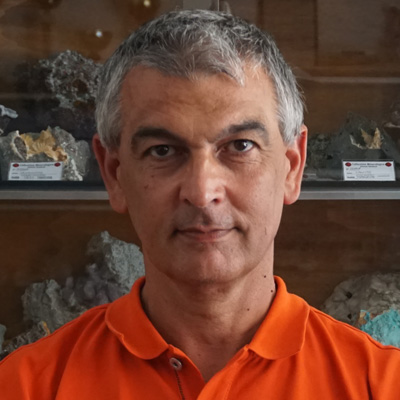
Danilo Bersani
Professor, University of Parma
Danilo Bersani is Full Professor of Applied Physics at the Department of Mathematical, Physical and Computer Sciences of the University of Parma (Italy). Danilo obtained a Degree in Physics (1992) and a PhD in Physics (1997) at the University of Parma where it was researcher (until 2014) and then associated professor in Physics (until 2023).
His most recent research activities are mainly concentrated in the fields of applications of vibrational spectroscopy to mineralogy and cultural heritage. His past research has mainly concerned the structural and dynamic characterization of crystalline and amorphous materials both of synthetic and of natural origin, including dimensional effects in nanocrystalline systems, the crystallization processes and the phase transformations.
Author of nearly 200 scientific publications in international journals, is proponent of 6 new mineral species approved by IMA. President of GeoRaman International Science Advisory Committee (GRISAC) between 2018 and 2021 and member since 2014.
Kepa Castro Ortiz de Pinedo
Universidad del País Vasco

Kepa Castro Ortiz de Pinedo
Associate Professor, Universidad del País Vasco
Kepa Castro obtained his Bachelor’s in Chemistry in 1999 and his PhD in Analytical Chemistry in 2004. Since 2016, He is associate professor at the UPV/EHU. Since 2004, he has held positions of responsability in more than 20 research projects, being even responsible of the Non-destructive Spectroscopy Laboratory (LASPEA) start-up at the SGIKer services from UPV/EHU. He has authored 127 articles about the study of the Cultural Heritage and Geochemistry. He has presented more than 250 communication and has given more than 30 talks at international conferences.
He has co-supervised 9 PhD thesis and is currently co-supervising 2 more about Cultural Heritage and Geochemistry. He has been involved in teaching activities in both the UPV/EHU and Finland Universities (as guest professor).
He has participated in several scientific expeditions to the archeological city of Pompeya and he is an expert in the handling of portable scientific instrumentation with several scientific works about in-situ geochemistry and cultural heritage. He participates in the NASA Mars2020 mission working on the SuperCam instrument. Although he likes his work, he prefers the mountain rather than working.
Marie-Camille Caumon
Université de Lorraine

Marie-Camille Caumon
Research engineer, Université de Lorraine
Luiz Fernando Cappa De Oliveira
Federal University of Juiz de Fora

Luiz Fernando Cappa De Oliveira
Professor, Federal University of Juiz de Fora
Luiz Fernando Cappa de Oliveira is Professor of Molecular Spectroscopy at the Chemistry Department of Federal University of Juiz de Fora (UFJF), MG, Brazil. He is the Head of Department, and research coordinator of the Molecular Spectroscopy and Structure Group of UFJF.
He has a BSc in Chemistry (1982), and his PhD was obtained in 1991 at University of São Paulo, Brazil, on resonance Raman effect. He was postdoctoral at University of Bradford (2001-2003), working on applications of Raman spectroscopy, and his interests are related to applications of Raman spectroscopy to the most diverse systems, including minerals, dyes and pigments, synthetic and natural products, food chemistry, inorganic and model systems, among other including infrared spectroscopy.
He has been a member of the GeoRaman International Advisory Committee (GRISAC) since 2012.
Howell Edwards
University of Bradford

Howell Edwards
Emeritus Professor, University of Bradford
Howell Edwards is Emeritus Professor of Molecular Spectroscopy at the University of Bradford, United Kingdom, and Director of the Centre for Astrobiology and Extremophiles Research ( CAER ) . With a first degree in Chemistry, he studied Raman spectroscopy at the University of Oxford and holds the MA , BSc and DPhil degrees from there.
After a research fellowship at the University of Cambridge, where he worked on the high-resolution rotational Raman spectra of gases , he joined the University of Bradford where he developed the applications of Raman spectroscopy to art forensics , archaeology , environmental biodeterioration of pigments and materials and the spectroscopic detection of explosives , drugs and illicit contraband materials.
He was an active participant in the first international GeoRaman meeting in 1996 and was founder-organiser of the biennial Raman in Art and Archaeology series of meetings in the British Museum in 2000. He is a scientific member of the ESA ExoMars mission, using Raman spectroscopy to detect remotely molecular biosignatures of life on Mars and their characterisation in terrestrial planetary analogue sites.
He has written or co-authored 24 books and has published 1400 papers on Raman spectroscopy and its applications. He is honorary scientific adviser to the de Brecy Trust for the evaluation of oil paintings.
Jan Jehlička
Charles University, Prague

Jan Jehlička
Professor, Charles University, Prague
Research
Following carbon and biomarkers in rocks to understand processes of their transformation, applying laboratory and field Raman spectroscopic techniques, exobiology applications from Terrestrial analogue sites of extremophile colonisations
- Raman spectroscopy in geochemistry
- Structural aspects of transformation of organic matter during geological processes
- Geochemistry of organic matter and carbon
- Exobiology and following distribution of biomarkers in rocks
Stefanos Karampelas
Laboratoire Français de Gemmologie

Stefanos Karampelas
Chief Gemmologist, Laboratoire Français de Gemmologie
Stefanos Karampelas is Chief Gemmologist at the Laboratoire Français de Gemmologie (LFG), Paris, and also teaches for the Advanced Gemmology Diploma at the University of Nantes, France.
He holds a BSc in Geology (2000) from Aristotle University of Thessaloniki (Greece), an MSc in Geosciences (2002) and an Advanced Gemmology Diploma (2007), both from the University of Nantes (France), and completed his PhD in Materials Physics (2008) at the University of Nantes (France) and in Mineralogy at Aristotle University of Thessaloniki (Greece). Since then, he has worked as a researcher in different gemological laboratories around the world.
His research interests include advanced non-destructive techniques which he applies to all types of gem materials. He is Secretary of the Gem Materials Commission of the International Mineralogical Association (IMA), a member of the GeoRaman International Advisory Committee (GRISAC), a delegate to the International Gemmological Conference (IGC), a member of the Editorial Board of Gems and Gemology and Associate Editor of the Journal of Gemmology and of Minerals.
Andrey Korsakov
V.S. Sobolev Institute of Geology and Mineralogy SB RAS, Novosibirsk

Andrey Korsakov
Professor, V.S. Sobolev Institute of Geology and Mineralogy SB RAS, Novosibirsk
Andrey V. Korsakov is Principal Investigator, Professor RAS at V.S. Sobolev Institute of Geology and Mineralogy SB RAS (Novosibirsk, Russian Federation). Andrey holds a BSc (1995) and MSc (1997) in Geology from the Novosibirsk State University and a PhD (2000) from United Institute of Geology, Geophysics and Mineralogy SB RAS (Novosibirsk). He had a postdoctoral researcher position (2003-2004) at the Royal Museum for Central Africa (Tervuren, Belgium).
Since 2004, his scientific career has been associated with the V.S. Sobolev Institute of Geology and Mineralogy SB RAS. His interests are mineralogy and petrology related to (ultra)high pressure metamorphism, application of Raman spectroscopic methods for reconstruction of metamorphic history, phase identification and recovery melt composition in minerals from deeply subducted crustal materials.
He has been a member of the GeoRAMAN International Advisory Committee (GRISAC) since 2008.
Maria Perraki
National Technical University of Athens
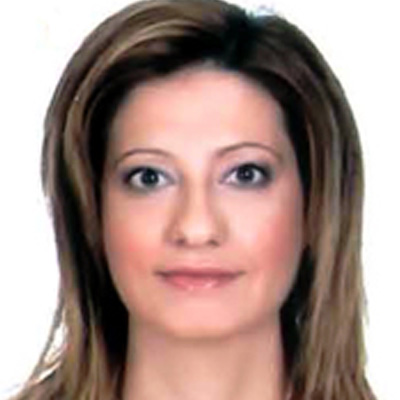
Maria Perraki
Professor, National Technical University of Athens
Maria Perraki is Professor of Mineralogy and Environmental Geochemistry at the National Technical University of Athens (NTUA, Greece). She is the director of the Mineralogical Museum gaio-ORAMA of NTUA.
Maria holds a BSc in Geology (1998) from the University of Athens (Greece) and a PhD (2003) from NTUA. She was a postdoctoral researcher (2003-2004) at the University of Graz (Austria) before joining NTUA School of Mining and Metallurgical Engineering (2004).
Her interests are mineralogy related to (ultra)high pressure minerals, mineral phase transformation and characterisation using vibrational spectroscopic Raman and FT-IR analytical methods and advanced electron microscopy and microanalysis techniques; applied and environmental mineralogy and geochemistry are her new research areas.
She has been a member of the GeoRAMAN International Advisory Committee (GRISAC) since 2006.
Alian Wang
Washington University in St. Louis
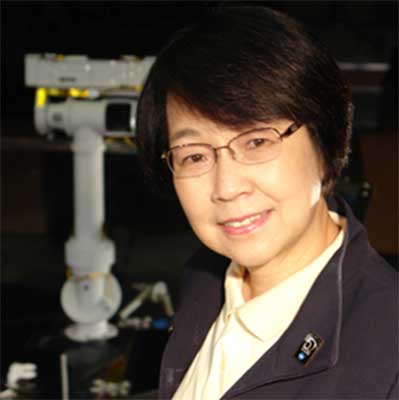
Alian Wang
Professor, Washington University in St. Louis
Alian Wang is a Professor of Planetary Spectroscopy at the Department of Earth and Planetary Science, Washington University in St. Louis (WUSTL). Alian got a Ph.D. in Spectrocemistry from LASIR-CNRS in France (1987) and has been working at WUSTL since 1993 (https://sites.wustl.edu/planetaryspectroscopy/).
Her team studies fundamental planetary science with an emphasis on the phase transformations of hydrous salts (sulfates, chloride & oxychlorine salts) on Mars, the mechanisms and environmental conditions, and the phase-transition rates and pathways.
Her recent study concentrated on the heterogeneous electrochemistry occurring at the surface of various planets, such as Mars, Venus, and Europa. Since 2000, Alian Wang has been playing the PI role in many US-NASA-supported projects and participated in planetary mission operations. Her work has taken her across the globe to study planetary analog sites at the Qinghai-Tibet Plateau in China; Svalbard in Norway; and the Atacama Desert in Chile.
Wang and her team build and maintain several international collaborations, as well as organize international workshops and conferences, including the 11th GeoRaman International Conference.
Honorary Members
David Smith
Muséum National d'Histoire Naturelle in Paris

David Smith
Emeritus Professor, Muséum National d'Histoire Naturelle in Paris
Professor David C. Smith is an Emeritus Professor in Mineralogy at the Département de l’Histoire de la Terre , Muséum National d’Histoire Naturelle in Paris, FRANCE. David does research in two main domains : 1. Mineralogy, Crystallography and Petrology of Metamorphic Rocks (including éclogites, UHPM (omphacite, coesite, lonsdaleite…) and 2. GEORAMAN with ARCHAEORAMAN (including pigments, gemstones….).
GeoRaman 2024 Organizing Committee
Maria Perraki
Chair
National Technical University of Athens

Maria Perraki
Professor, National Technical University of Athens
Maria Perraki is Professor of Mineralogy and Environmental Geochemistry at the National Technical University of Athens (NTUA, Greece). She is the director of the Mineralogical Museum gaio-ORAMA of NTUA.
Maria holds a BSc in Geology (1998) from the University of Athens (Greece) and a PhD (2003) from NTUA. She was a postdoctoral researcher (2003-2004) at the University of Graz (Austria) before joining NTUA School of Mining and Metallurgical Engineering (2004).
Her interests are mineralogy related to (ultra)high pressure minerals, mineral phase transformation and characterisation using vibrational spectroscopic Raman and FT-IR analytical methods and advanced electron microscopy and microanalysis techniques; applied and environmental mineralogy and geochemistry are her new research areas.
She has been a member of the GeoRAMAN International Advisory Committee (GRISAC) since 2006.
Stefanos Karampelas
Vice Chair
Laboratoire Français de Gemmologie

Stefanos Karampelas
Chief Gemmologist, Laboratoire Français de Gemmologie
Stefanos Karampelas is Chief Gemmologist at the Laboratoire Français de Gemmologie (LFG), Paris, and also teaches for the Advanced Gemmology Diploma at the University of Nantes, France.
He holds a BSc in Geology (2000) from Aristotle University of Thessaloniki (Greece), an MSc in Geosciences (2002) and an Advanced Gemmology Diploma (2007), both from the University of Nantes (France), and completed his PhD in Materials Physics (2008) at the University of Nantes (France) and in Mineralogy at Aristotle University of Thessaloniki (Greece). Since then, he has worked as a researcher in different gemological laboratories around the world.
His research interests include advanced non-destructive techniques which he applies to all types of gem materials. He is Secretary of the Gem Materials Commission of the International Mineralogical Association (IMA), a member of the GeoRaman International Advisory Committee (GRISAC), a delegate to the International Gemmological Conference (IGC), a member of the Editorial Board of Gems and Gemology and Associate Editor of the Journal of Gemmology and of Minerals.
Manolis Stefanakis
University of the Aegean

Manolis Stefanakis
Professor, University of the Aegean
Manolis I. Stefanakis is Professor of Classical Archaeology and Numismatics at the Department of Mediterranean Studies, University of the Aegean and director of the Departmental Laboratories of Archaeometry and of Environmental Archaeology.
He is Director of the University of the Aegean Archaeological Research in Kymissala, Rhodes since 2006 and co-director of the excavation of the fortified citadel of Orne in Retymno, Crete, since 2016; co-founder and Publishing Director of the annual scientific journal Eulimene: Studies in Classical Archaeology, Epigraphy, Numismatics and Papyrology, Rethymno-Mediterranean Archaeological Society, of the Eulimene Series of Independent Publications, Rethymno-Mediterranean Archaeological Society and of the annual scientific journal Yearbook of Mediterranean Studies, Rhodes.
He is a member of the Local Council of Monuments of the Dodecanese – Ministry of Culture. His research interests focus on Field Archaeology, Archaeology and Sustainability, Classical Archaeology, Ancient Greek Numismatics, and Archaeoseismology.
Stelios Bakolas
National Technical University of Athens

Stelios Bakolas
Professor, National Technical University of Athens
Asterios Bakolas is Professor in the Department of Materials Science and Engineering of the School of Chemical Engineering of National Technical University of Athens (NTUA). He is currently the Director of Materials Science and Engineering Lab and Director of the direction “Materials and Conservation Interventions”, MSc “Protection of Monuments”.
Recently he was appointed a member of the Committee for the Conservation of the Acropolis Monuments.
Asterios holds a BSc in Industrial Chemistry (1991) from the University of Venice (Italy) and a PhD (2002) from NTUA.
His research interests focus on the pathology of building materials of historic structures using non-destructive and analytical techniques and the design of compatible materials for the structural and surface conservation of monuments.
Maria Nikopoulou
Aristotle University of Thessaloniki
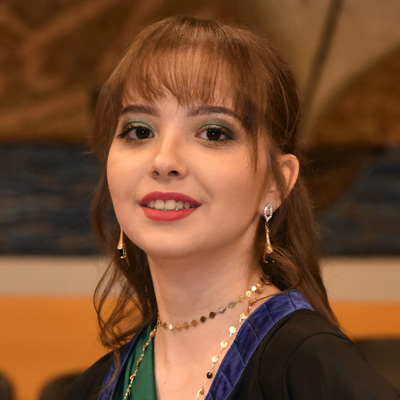
Maria Nikopoulou
MSc. Geologist, PhD Candidate, Aristotle University of Thessaloniki
Maria Nikopoulou is a PhD student at the Aristotle University of Thessaloniki. She holds a BSc in Geology (2019) from Aristotle University of Thessaloniki with specialisation in Mineralogy and Petrology. She completed her MSc in the Department of Chemistry (2021) also from Aristotle University of Thessaloniki in the field of “Physical and chemical methods for the diagnosis of corruption in cultural heritage materials”.
She also holds an Applied Jewellery Professional Diploma from the Gemological Institute of America and is currently studying for her Graduate Gemologist Diploma.
Her research interests are in mineralogy, gemology, archaeogemology and achaeometry.
Georgios Polymeris
National Centre for Scientific Research "Demokritos"
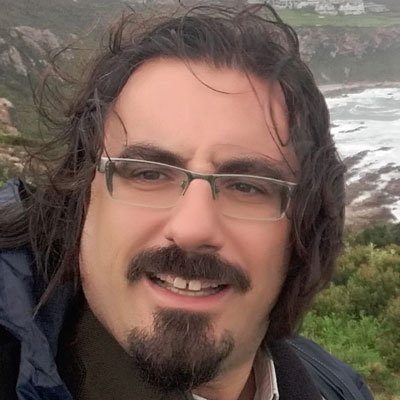
Georgios Polymeris
Researcher, National Centre for Scientific Research "Demokritos"
Dr. George S. Polymeris is a researcher at the laboratory of RadioCarbon Dating and Other Technologies (RCDOT), at the Institute of Nanoscience and Nanotechnology of the National Centre for Scientific Research “Demokritos” in Greece since 2020.
He holds a BSc in Physics (1998) from Aristotle University of Thessaloniki (Greece) and a PhD in luminescence dosimetry and dating applications from the same university. He has completed 3 post docs in related topics (2009, Cultural & Educational Technologies Institute, Xanthi-Greece; 2010, Işik University, Istanbul-Turkey and 2014, Aristotle University of Thessaloniki). From 2014 until 2020 he has worked as an assistant professor at the Institute of Nuclear Sciences of Ankara University (Ankara, Turkey).
He is a specialist in dating and age assessment applications to archaeology and geology, mostly using the techniques of radiocarbon dating (14C), Thermoluminescence (TL), Optically Stimulated Luminescence (OSL) and Electron Paramagnetic Resonance (EPR). Following his pioneer studies on Al2O3:C and quartz towards accessing stable very deep electron traps, his group have introduced a new methodological approach for both dosimetric and luminescence age limits extension that includes simultaneous thermal and optical stimulation; it is the so-called TA – OSL technique. His other research interests include (a) the use of Fourier Transform Infrared (FTIR) spectroscopy in materials’ characterization, (b) palaeothermometry studies in pottery and masonry and (c) alternative applications of luminescence, such as thermochronology.
He co-chaired the 6th Asian Pacific Luminescence and Electron Spin Resonance Dating Conference (6th APLED), between 26 and 28 September 2022, in Ankara, Turkey.
Despoina Psarraki
National Technical University of Athens

Despoina Psarraki
Mining-Metallurgist Engineer, MSc, PhD Candidate, National Technical University of Athens
Despoina Psarraki is a PhD student at the School of Mining and Metallurgical Engineering (SMME), National Technical University of Athens (NTUA), Greece. She holds an integrated Master’s degree in Mining Engineering (SMME – NTUA, 2019) and an MSc degree in Water Resources Science and Technology (School of Civil Engineering – NTUA, 2022).
She has experience in geochemical modelling, mine lake remediation, GIS analysis and geochemistry of water and soil, especially mobilisation mechanisms of metals and metalloids.
Anastasia Rousaki
National Centre for Scientific Research "Demokritos"

Anastasia Rousaki
Postdoctoral Researcher, National Centre for Scientific Research "Demokritos"
Dr. Anastasia Rousaki is a postdoctoral researcher at the Ceramics and Composite Materials research group, at the Institute of Nanoscience and Nanotechnology of the National Centre for Scientific Research “Demokritos”.
Anastasia obtained a BSc. in Physics (2011, Aristotle University of Thessaloniki), a MSc. in Materials Physics & Technology (2013, Aristotle University of Thessaloniki) and a PhD in Chemistry (2018, Ghent University, Belgium). From 2018 until 2023, she was a postdoctoral researcher at the Department of Chemistry (Raman Spectroscopy research group) of Ghent University.
She specializes in the application of (benchtop, mobile) Raman spectroscopy on a variety of materials (associated with geology, biology, science and technology) including those related to cultural heritage objects/works of art. She has co-authored 37 peer reviewed articles, 6 book chapters and she has 76 presentations in international conferences. Anastasia has given 8 invited/keynote lectures and assisted/organized 12 short/long term mobile measurement campaigns of geological and archaeometry/cultural heritage science interest. Moreover she (co) chaired in 2023, the 11th International Conference on the Application of Raman Spectroscopy in Art and Archaeology (RAA2023) held in Athens, Greece (a collaboration between Ghent University and the National Gallery-Alexandros Soutzos Museum) and she is a member of the scientific committee of the same conference.
Vasilis Skliros
National Technical University of Athens
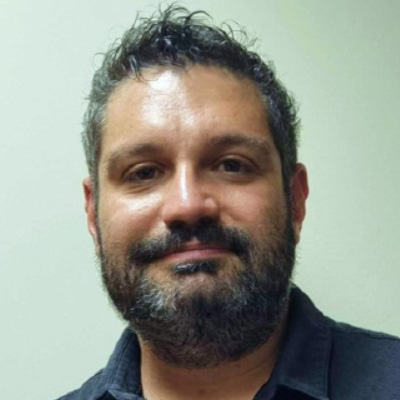
Vasilis Skliros
MSc. Geologist, PhD, National Technical University of Athens
Vasilis Skliros is a graduate of the Faculty of Geology of the University of Patras, holds a postgraduate degree in Earth Sciences and Environment in the Department of ”Raw Materials and Environment” of the Faculty of Geology of the University of Patras and a PhD in Mineralogy from the School of Mining and Metallurgical Engineering of the National Technical University of Athens.
His research interests are mainly focused on mining, applied mineralogy, industrial minerals and rock analysis (structure, composition, use/applications), petrology and the application of spectroscopic methods in geosciences. He is trained in a wide range of modern analytical methods in mineral and rock analysis with various applications, such as optical microscopy, electron microscopy, differential thermal analysis, X-ray diffraction, Fourier transform infrared spectroscopy and Raman spectroscopy.
He has participated in several research programmes at the National Technical University of Athens and the Hellenic Survey of Geology and Mineral Exploration.
Stavros Triantafyllidis
National Technical University of Athens

Stavros Triantafyllidis
Assistant Professor, National Technical University of Athens
Stavros Triantafyllidis is Assistant Professor of Ore Deposit Geology at the National Technical University of Athens. Stavros Triantafyllidis graduated from the Faculty of Geology and Geoenvironment of the National Kapodistrian University of Athens (2000) and received his Master’s degree (MSc) in Environmental Geochemistry in 2002. In 2006 he obtained his PhD in the field of ore deposit geology and environmental geochemistry.
Stavros was a postdoctoral researcher at St Mary’s University in Halifax, Nova Scotia, Canada in 2007-2008.
His research interests include the exploration, study and definition of ore deposits with particular emphasis on sulphide mineralisation, applied geochemistry and environmental geochemistry with emphasis on climatic changes in coastal areas, as well as isotope geochemistry and geochronology and remediation of polluted areas.
Asimina Vafiadou
University of the Aegean
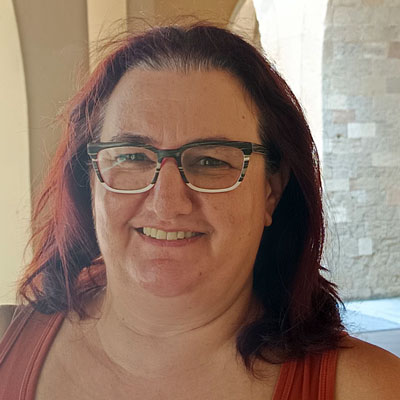
Asimina Vafiadou
Specialized Research and Teaching Staff, University of the Aegean
Asimina Vafiadou is Specialized Research and Teaching Staff in the laboratory of Archaeometry of the Department of Mediterranean Studies (expertise in archaeology and natural sciences).
She studied Physics at the Physics Department of the Aristotle University of Thessaloniki. She was a scholar of the Danish Institute of Athens for a 3 month research activity concerning issues on luminescence phenomena and luminescence dating of archaeological material at Risoe, The National Laboratory, in the department Nordic Center for Luminescence Research, as well as the State Scholarships Foundation for a doctoral thesis which was completed in 2007.
Her research activity focuses on the study of the properties and dating of rock material, archaeological or geological, and archaeological ceramics, and on the characterization and provenance research of studies of archaeological material. She has written papers on scientific journals and participated at conferences and workshops related to these subjects.
Eleni Vasileiou
National Technical University of Athens
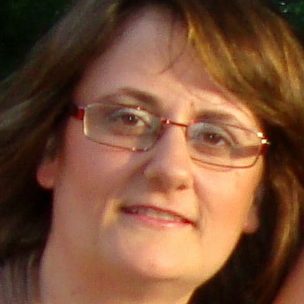
Eleni Vasileiou
Teaching & Research Associate, National Technical University of Athens
Dr. Eleni Vasileiou, is Research and Teaching Staff at the School of Mining and Metallurgical Engineering of National Technical University of Athens (NTUA) (expertise in Groundwater Contamination and Environmental Hydrogeology).
Eleni Vasileiou is Mining and Metallurgical Engineer, graduated from National Technical University of Athens (1997) and received her Master’s degree (MSc) in Environmental Hydrogeology and Groundwater Contamination in 2013 from Agricultural University of Athens from the Post-graduate Studies entitled : “Geological and Atmospheric environment for the infrastructure projects and planning’’. In 2011 she obtained her PhD in the field of Environmental Hydrogeology from NTUA.
Her main research interests are Environmental Hydrogeology, Groundwater Contamination, Groundwater Engineering, Water Quality and Vulnerability of aquifers, Mine water management, Environmental pressures, DPSIR and SWOT analysis, Hydro-geo-chemical Modeling, Water Resources Management, Risk Assessment of Water Resources, Rehabilitation of post mining areas, Hydro-geochemistry, Water rock interaction, Land Uses and Water quality, Climate changes and water resources, Microplastics in water environment.
Webmaster
Ioannis Tzigkounakis
National Technical University of Athens

Ioannis Tzigkounakis
Specialized Technical Laboratory Staff, National Technical University of Athens
Ioannis P. Tzigkounakis, is currently a Laboratory Technical Staff member at School of Chemical Engineering, National Technical University of Athens.
He received a degree in Chemical Engineering from the National Technical University of Athens (1999) and a postgraduate degree (MSc) at Information Systems from the Hellenic Open University (2015).
His current work position is at the Computer Center of the faculty as network administrator and as web and applications developer. He has over 10 years of experience designing, developing, integrating, and supporting web services and software applications, including content management, database architecture, and e-learning.
His expertise is mostly in PHP, Javascript, HTML, CSS, database design and implementation, website and applications design.





